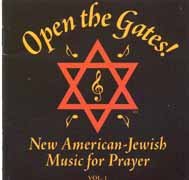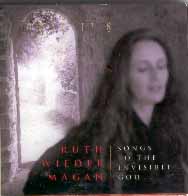
Melinda Given Guttmann
In Defense of the Cantor in Judaism
When music by the famed theater composer Elizabeth Swados appeared on Robert Cohen's new CD, "Open the Gates," we sent the anthology off to Melinda Guttmann for a theater critic's eye view. "Open the Gates" threorizes that the new American Jewish heart may be found in American Jewish composers who are more more reflective of Woody Guthrie or Judy Collins than the synagogue choirs of the 19th and early 20th centuries. Guttmann disagrees, and avers that the most significant American addition to Jewish spirituality is not found in popular music, but in the voice of the woman cantor. Here, she reflects on three different CDs of modern sacred Jewish music: "Open the Gates! New American-Jewish Music for Prayer,"(Robert Cohen Producer, 2002); "Sacred Chants of the Contemporary Synagogue," featuring Cantor Rebecca Garfein (Bar Productions, 1998); and "Songs to the Invisible God," Ruth Wieder Magan, 2001 (Sounds True).
"Open the Gates! New American-Jewish
Music for Prayer," Robert Cohen Producer, 2002. (ZC Music Group 2075)
"Sacred Chants of the Contemporary Synagogue," Cantor Rebecca
Garfein, Bari Productions, 1998 (1892)
"Songs to the Invisible God," Ruth Weider Magan, 2001, Sounds
True
Although the Rabbis' interpretation of the Torah and the practices of Judaism vary among the various traditions-- from the Orthodox, Reform, Conservative, Progressive, and Reconstructionist-- a spectrum of cultural signifiers mark the congregations of synagogues in keeping with each national identity as a result of the Diaspora.
A pure, universal signifier of the Jews' relationship with God, which is transnational, is the voice and the prayers of the Cantor, whose education and connection to God remains constant; and whose sacramental prayer for the dead, the Kaddish, as well as the sacred songs of the High Holidays, are universally known to all Jews and are sung in all synagogues. Hebrew letters are multi-valenced vibrations which are composed of spirit, not material. The Hewbrew language is not considered a human creation, but a sacred manifestation of God. There is a story among Medieval Jewish scholars about a Rabbi who was burned at the stake during a pogrom wrapped in a Torah. As the flames rose, his students asked, "what is happening?", the Rabbi replied, "the parchment is burning , but the letters are ascending to their immaterial, eternal origin in God."
 |
| "Open the Gates!--New American-Jewish Music for Prayer," compiled by Robert Cohen. |
Robert Cohen's "Open the Gates!" is a collection of works in which contemporary composers, following the post-modern collapsing of the hegemony of the sacred into the secular; and formal linguistic structures into the conversational, have created music and lyrics which are informal, comfortable, and give Jewish music an American flavor. This, Cohen avers, brings Jews closer to God than the "elitist" Cantor who sings down to them, based on "sophisticated" European music and operated modes which are alienating and outdated: what Peter Brook would call the "Dead Theatre." Think about uninspiring Cantors, who sing in a mechanical tone, to congregations which do not know Hebrew, in high language which appears pretentious.
The songs and lyrics in "Open the Gates!" far from being revolutionary and American, are fairly mundane both in lyrics and musical tone. They all lack passion. The words are awkward and patriarchal, constantly referring to God as the "King of Kings," and continuing to privilege the masculinity of God. As a song lyric, "God, fill my mouth with prayer" is awkward in phrasing and places the worshipper as a passive receiver, not a creator of praises. I find the arguments against the aesthetics of "high art" to be pretensions and these creations justified with an unjustifiable superiority.
I also find that a search for an American music and diction is certainly readily found in the magnificence of the African-American Baptist gospel, where one finds a simple melody and phrasing, like "Swing Low, Sweet Chariot" to be deeply moving, communal, and on a profound sacred ground not related to the European's love of the complex and Baroque.
 |
| "Sacred Chants of the Contempoprary Synagogue," featuring Cantor Rebecca Garfein, was recorded at the Berlin Jewish Cultural Festival in 1997. |
By chance, I have discovered that a miracle has occurred for American Jews: in the voice of the American woman Cantor, who had been historically denied this rigorous Jewish education. It is an original Jewish voice; and the texts are non-gendered, and speak to the Eyn Sof: the Invisible God, the Hidden God, the One of both theistic and monist mystical Judaism which we have never before heard in the history of Judaism. As the emergence of women Rabbis and women Cantors in the last few decades, based on feminist ground, and a renewed interest in an authentic spirituality, some miraculous changes have occurred in the experience of the Cantor's voice. For centuries, the Jewish sacred music tradition has forbidden women from singing its holy music. I recommend not only to Jews but to members of all faiths the transcencent Cantorial voice of Rebecca Garfein, and the holy voice of Ruth Wieder Magan, director of Theatre Company Jerusalem. From the first note of Cantor Garfein's Shalom Rav: "O Eternal Source of peace. Let Israel your people know enduring peace. . . ." the heart of the audience is opened with a flowing love intertwined with sorrow and the beauty of the phrasing. These two feelings combine with a radiance which deepens the hope for the "soul's" connection with eternal peace and which lightens the burden of transcient political pain.
 |
| Ruth Wieder Magan, "Songs to the Invisible God" |
Although Jews use the word Adonai for God, the Unity of the Universe, and the continual revelation of the Invisible God, the source of all being, Eyn Sof, is the center of Ruth Wieder Magan's yearning in her ravishingly expressive interpretations of sacred songs. She has moved audiences to tears, kneeling and awe inspired silence throughout the Holy Land and Europe. She can with the permutations of one vowel, alter your consciousness, and bring you with her towards the magical appearence of the Jewish God; the highest philosophical and religious conception in history, which affirms the Jews as the "chosen" people. The sound of one letter like "Aleph" has the power of "OM" in its power.
I was raised as a Christian, from German-speaking Viennese Jewish ancestors who converted to Catholicism several generations ago in order to obtain titles (that of Baron in our case) and political power. I found that I had a "Jewish soul" after studying Jewish healing mediation, which I now teach, and after writing the first biography of the leader of the first Jewish feminist movement, Bertha Pappenheim. I know that the divine presence is within all of us, and that through meditation, music, and movement, divine dialogue and connection is possible for everyone. I invite you to write to me or to continue this dialogue on religious practices both as theatre and as a flame of light during this dark global era.[Guttmann]
NYTW readers may email Melinda Guttmann at: starnyc@aol.com
| museums | NYTW mail | recordings | coupons | publications | classified |